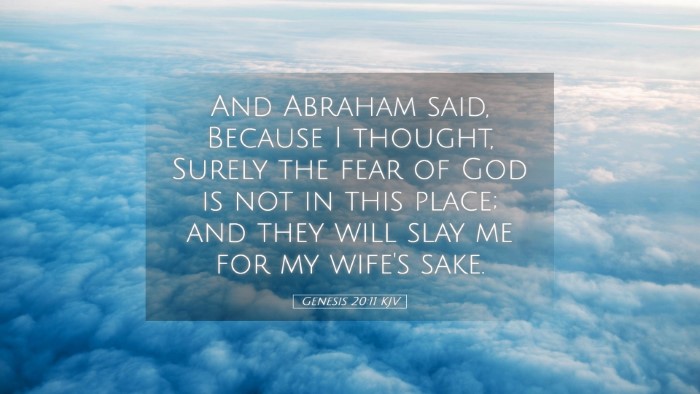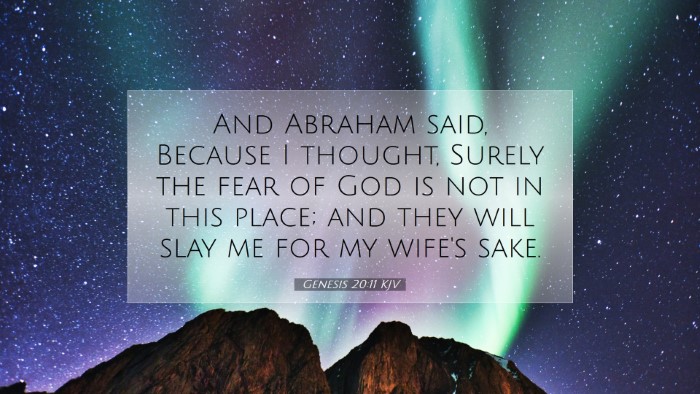Commentary on Genesis 20:11
Verse Analysis: Genesis 20:11 states: "And Abraham said, 'Because I thought, surely the fear of God is not in this place; and they will kill me on account of my wife.'" This verse presents a pivotal moment in the narrative of Abraham, reflecting his fears and the rationale behind his actions.
Contextual Overview
This chapter narrates an event in the life of Abraham where he sojourns in Gerar, a Philistine city, and encounters King Abimelech. Abraham's decision to misrepresent Sarah as his sister arises from a perception of danger based on his understanding of the fear of God within the local populace.
Theological Insights
The verse reveals several layers of theology, particularly concerning the nature of fear and faith. Abraham’s reasoning indicates a lapse in confidence regarding God’s protection. As scholars have noted, this narrative forms a contrast to Abraham's earlier characteristics of unwavering faith.
Examination of Fear as a Motivator
This is a sobering reminder of how fear can lead to actions contrary to our faith. According to Matthew Henry, the fear of man can result in the abandonment of truth and principles. Abraham’s statement underscores the fragility of faith when confronted with perceived threats.
Understanding the Fear of God
Albert Barnes interprets the "fear of God" as a reverence that compels moral behavior. Abraham’s assertion implies that he believes the people of Gerar lack this reverence, increasing his fear for his safety. It serves as a reflection on the moral state of the nations surrounding the covenant community.
Character Analysis of Abraham
Adam Clarke highlights the psychological turmoil of Abraham in this passage. Once a man of great faith, Abraham exhibits a moment of weakness characterized by doubt. This analysis aligns with the larger biblical themes of human frailty and the ongoing tension between faith and fear.
Comparison to Previous Events
In relation to previous events where Abraham had demonstrated unwavering faith, such as the promise of Isaac, this episode becomes an important lesson in the journey of faith. It highlights that even the most faithful can falter under pressure, emphasizing the need for continual reliance on God.
Practical Applications for Today
For pastors and theologians, this narrative provides a foundation for discussing the reality of human fear in spiritual life. Matthew Henry notes the danger of measuring circumstances devoid of divine perspective, which is a challenge often faced in ministry.
- Emphasizing Trust in God: The Scripture serves as a crucial reminder to pastors and church leaders to put their trust in God's promises amid uncertainties.
- Addressing Fear in Congregations: This verse can be a springboard for teaching about the nature of fear, encouraging believers to seek the fear of God rather than the fear of man.
- Encouraging Vulnerability: The openness of Abraham's struggles allows for discussions about the importance of honesty in faith journeys, fostering an environment where congregants can share their fears.
Conclusion
Genesis 20:11 serves as a profound reminder of the tensions between fear and faith. The insights from well-respected commentaries provide a multi-faceted understanding of this passage, encouraging a deeper exploration of human behavior in relation to divine expectations. For students and scholars, it illustrates the complexity of biblical narratives, compelling us to reflect on our own responses to fear and the importance of maintaining a God-centered perspective in our lives.


